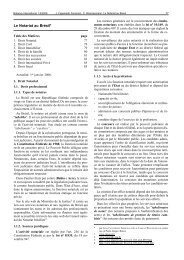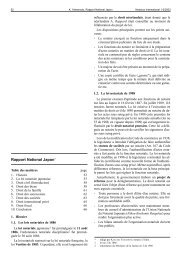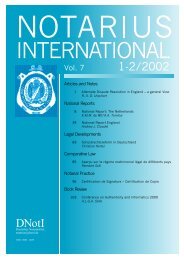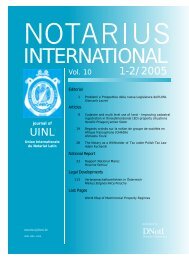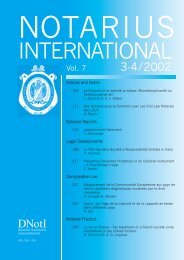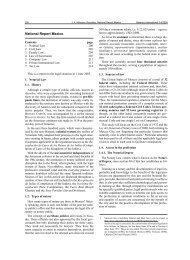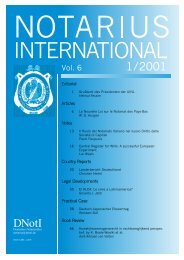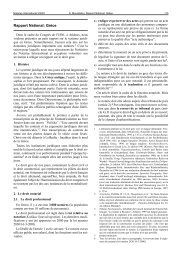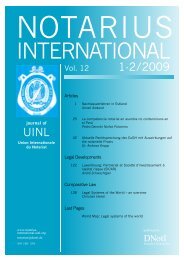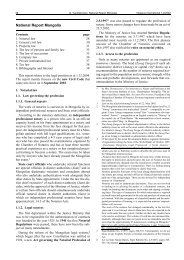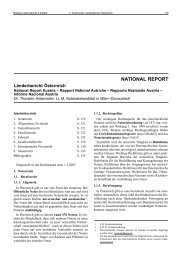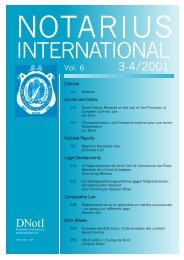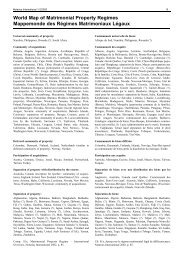Create successful ePaper yourself
Turn your PDF publications into a flip-book with our unique Google optimized e-Paper software.
206 J. A. Márquez González, National Report Mexico <strong>Notarius</strong> <strong>International</strong> 3-4/<strong>2005</strong><br />
60), the Civil Codes of Michoacán (article 173), Querétaro<br />
(article 166), Tlaxcala (article 60) and Yucatán (article<br />
117) and the Federal Code of Zacatecas (article 138) and<br />
separation of property will then be considered as established,<br />
with the relevant legal effects.<br />
The other codes contain no express provision in this regard.<br />
3.4.4. Marriage Contracts on separation of property<br />
The contract that establishes separation of property<br />
must be recorded in an authentic act if that is the case,<br />
except when made prior to the marriage (article 180<br />
CCDF). In any case, it must contain a specific inventory<br />
for each solely-owned asset and any debts.<br />
The most important legal consequence of separation of<br />
property is, naturally, the unquestionable ownership of the<br />
solely-owned assets. Thus, the income from assets continues<br />
to belong to the spouse that owns them. It is also expressly<br />
established that each spouse has the sole right to acquire<br />
and manage income from services provided by them.<br />
There is a very important exception to this relating to<br />
cases in which the spouses acquire property jointly by donation,<br />
inheritance, bequest, gift or any other title free of<br />
charge. In this case, both spouses are responsible for the<br />
management of the asset and it is considered that the relevant<br />
division must be carried out.<br />
Neither of the spouses may charge the other fees for<br />
personal services, but a recent, somewhat controversial,<br />
amendment in Mexico City now provides that compensation<br />
may be demanded of up to 50% of the assets acquired<br />
in the marriage (article 289 bis of the CCFD.<br />
3.5. Consensual property regimes and marriage contracts<br />
As we have already seen, our law allows the spouses to<br />
make any express marriage contract that they see fit either<br />
to create property held jointly by the spouses or establish<br />
separation of property. In any case, the contract<br />
defines their situation with regard to property.<br />
However, the law establishes the legal presumption that<br />
everything that is not expressly stipulated must be governed<br />
by the general provisions applying to property held<br />
jointly by the spouses (articles 183-206 bis of the CCFD).<br />
Section V of article 98 states that an application to marry<br />
must necessarily be accompanied by an agreement made<br />
by the prospective spouses with regard to their assets,<br />
which must clearly state the type of system agreed. Other<br />
legal systems, on the other hand, are much more specific<br />
in that regard.<br />
The second paragraph of article 171 of the Civil Code<br />
of Veracruz states that, when the presumption has been<br />
applied, the rules provided for civil societies or co-ownership<br />
will apply as far as possible. Nevertheless, a recent<br />
reform now requires the simultaneous presence before a<br />
notary of both spouses in an acquisition in order for any<br />
asset to be considered as an indivisible, communal asset.<br />
Furthermore, most federal states in the republic no longer<br />
require the need for judicial authorisation to make<br />
agreements between spouses. Hardly a dozen states still<br />
require permission: Campeche (articles 185 and 186),<br />
Chiapas (articles 171 and 172), Guerrero (articles 432<br />
and 433), Hidalgo (articles 176 and 177), Michoacán (articles<br />
170 and 171), Oaxaca (articles 173, 174 and 175),<br />
Quintana Roo (articles 712, 713 and 714), San Luis Potosí<br />
(articles 159 and 160), Sinaloa (articles 174 and 175),<br />
Tabasco (articles 173, 174 and 175), Tlaxcala (article 58)<br />
and Zacatecas (articles 131 and 132). 5<br />
3.6. Maintenance and alimony<br />
The concept of maintenance contained in Mexican law is<br />
extremely broad. Thus, article 308 states that “Maintenance<br />
consists of food, clothes, housing and treatment in<br />
the event of illness. As far as minors are concerned, maintenance<br />
also includes the necessary costs of primary education<br />
for the person receiving the maintenance and to provide<br />
that person with some honest trade, art or profession<br />
appropriate to his or her sex and personal circumstances”.<br />
In the case of divorce, the general principle established<br />
in article 302 should apply: “The spouses must provide<br />
alimony for each other; the law will determine when this<br />
obligation continues to exist in cases of divorce and other<br />
cases stated in the law itself”.<br />
Article 288 states that in cases of necessary divorce, the<br />
guilty party may be ordered to pay for alimony to the innocent<br />
spouse and even in cases of divorce by mutual<br />
consent, the former wife may receive alimony for the<br />
same length of time as the duration of the marriage,<br />
provided that she does not have sufficient income or does<br />
not find another partner. The former husband has the<br />
same right, but he must prove that he is unable to work<br />
and lacks sufficient income.<br />
3.7. Non-marital joint property (homosexual or heterosexual)<br />
or marriage between homosexuals<br />
3.7.1. Cohabitation without marriage<br />
This has been established, since our civil law attaches<br />
particular importance to the institution of marriage. Proof<br />
of that is the complex solemnity of the requirements for<br />
its celebration (articles 97-113 of the CCFD) and in the<br />
inclusion of basic principles governing the origin and stable<br />
development of the family (4th article of the PCUSM;<br />
articles 162, 163, 164, 168 of the CCFD; article 940 of<br />
the Code of Civil Procedure of the Federal District).<br />
In the philosophical dogma relating to this context, it is<br />
clear that the legislator attaches small importance to other<br />
types of institutions that in some way differ from the<br />
legal formality of the institution of marriage. This is the<br />
case, in fact, with relationships occurring between unmarried<br />
people. What in ordinary language is known as a<br />
“unión libre” (free relationship) is referred to as “concubinato”<br />
(cohabitation) in our civil law.<br />
Nevertheless, from the social point of view, free relationships<br />
are nowadays common either for reasons of mu-<br />
5 FERNANDO ANTONIO CÁRDENAS GONZÁLEZ, „Autorización judicial<br />
para contratar entre cónyuges“ (Judicial authorisation to make<br />
agreements between spouses), in escribano, the official journal of the<br />
ANNM (Mexican Association of Notaries), AC., no. 28, Mexico,<br />
2003, page 22.



